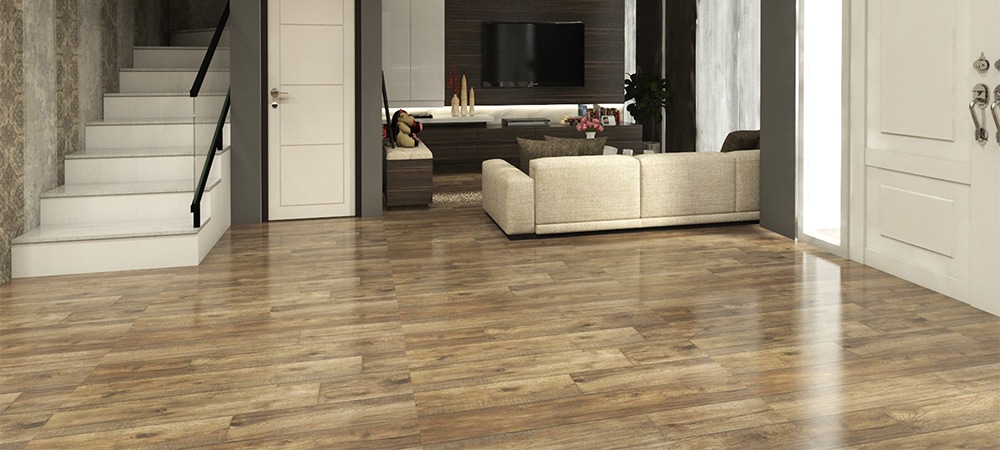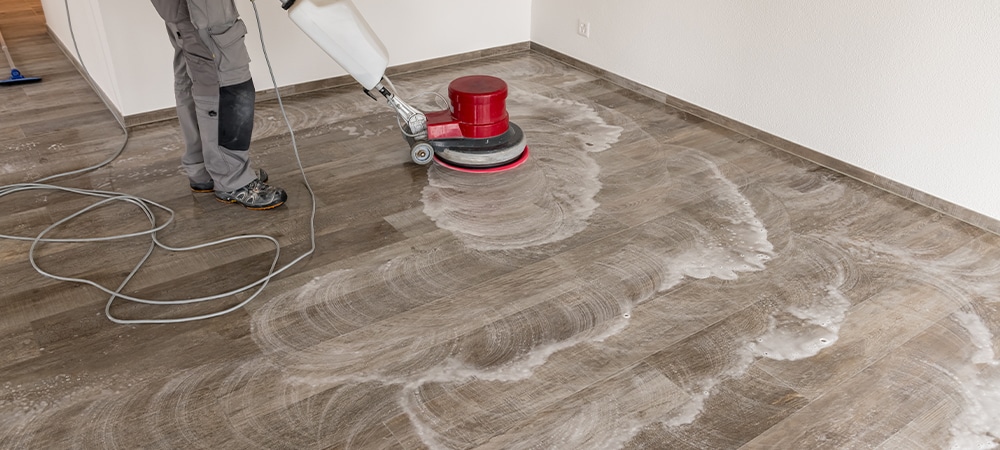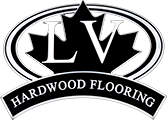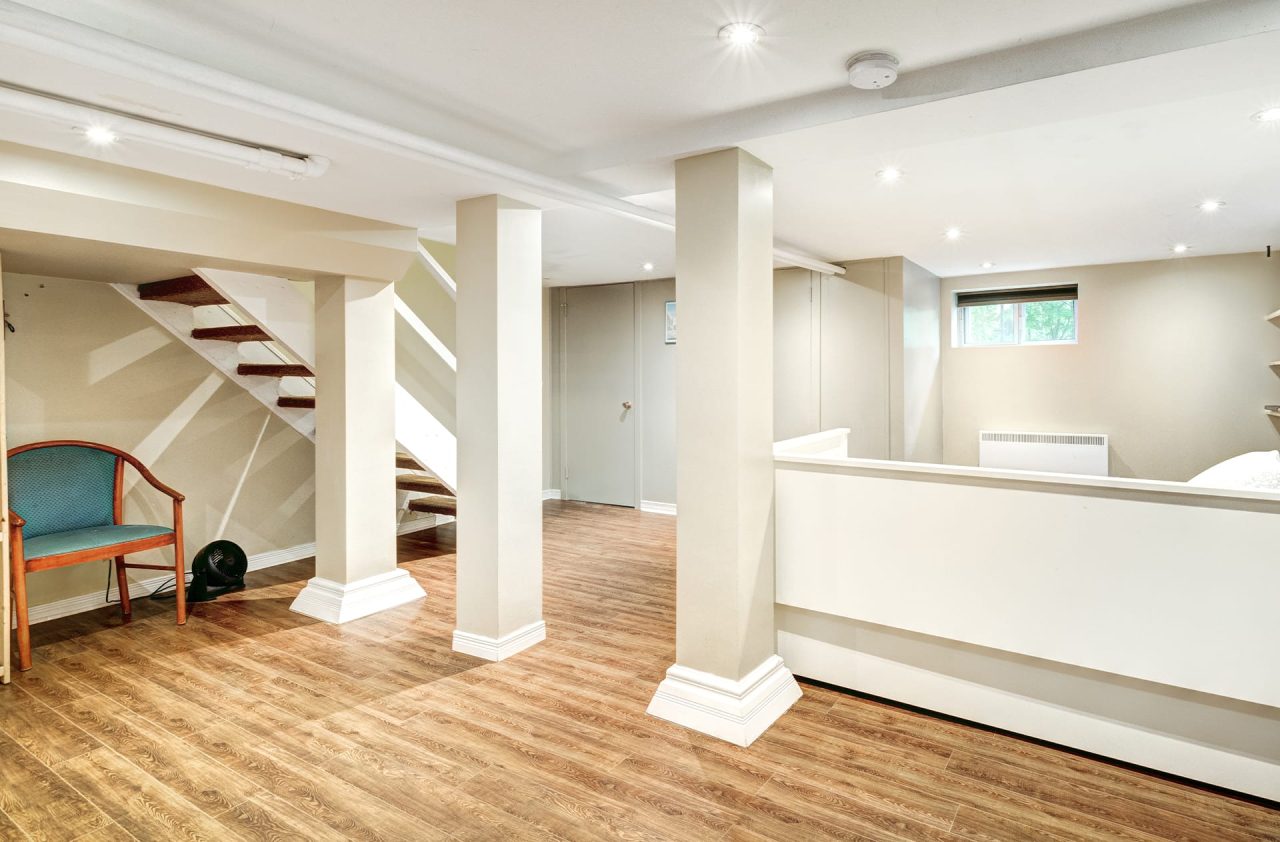Choosing the best flooring for a basement is a critical decision that homeowners face when renovating or finishing their lower levels. Basements are unique spaces within a home, often serving multiple purposes, such as additional living areas, playrooms, or storage spaces.
However, they also present unique challenges, including moisture, temperature fluctuations, and lower levels of natural light. Therefore, the best basement flooring options are tiles (ceramic, porcelain or carpet), laminate, engineered hardwood and luxury vinyl plank flooring. These flooring options are ideal for humidity-prone areas like the basement.
This article serves as a guide to help you select the best flooring for your basement, combining durability, aesthetics, and comfort.
Top Flooring Options for Basements
Before delving into flooring options, it’s essential to understand the conditions that typically characterize basements. Due to their proximity to the ground, most basements are prone to higher moisture levels.
This moisture can come from external sources, such as rainwater seepage, or internal sources, such as humidity from home activities. Temperature fluctuations are also common, with basements often being cooler than the rest of the house.
These conditions necessitate careful consideration when choosing basement flooring to ensure longevity and prevent damage. Here are the best flooring options for a basement.
Luxury Vinyl Plank (LVP) or Tile (LVT)
Luxury Vinyl Plank (LVP) and Luxury Vinyl Tile (LVT) are excellent choices for basement flooring due to their durability, water resistance, and versatility in design. They can mimic the look of hardwood or natural stone while providing a more forgiving surface that’s easier to maintain.
Vinyl flooring is also easy to install. It often features a click-lock system that floats over the existing subfloor, making it ideal for DIY enthusiasts.
Related Article: How Do You Make Laminate Flooring Water Resistant? A Comprehensive Guide

Engineered Hardwood
While traditional hardwood may not be the best choice for basements due to moisture concerns, engineered hardwood can be a viable alternative. Engineered hardwood consists of a real hardwood veneer atop multiple layers of plywood or high-density fiberboard (HDF), providing stability and reducing the risk of warping.
When choosing engineered hardwood for a basement, look for products with a robust wear layer and consider using a moisture barrier during installation.
Ceramic or Porcelain Tile
Ceramic and porcelain tiles are highly resistant to moisture, making them suitable for basements. They’re available in various styles, colours, and patterns, allowing homeowners to create customized looks.
Tiles are also durable and easy to clean, though they can feel cold underfoot. Installing a radiant heating system beneath the tiles can enhance comfort, making your basement a cozy retreat during cooler months.
Laminate Flooring
Modern laminate flooring is an attractive flooring choice for basements, thanks to technological advancements that have improved its moisture resistance. High-quality laminate can provide the appearance of wood or tile at a more affordable price point.
When buying laminate flooring in Ontario for your basement, opt for products specifically designed for high-moisture areas. Also, consider using an underlayment that offers additional moisture protection.
Concrete Flooring
For those seeking a contemporary, industrial look, polished or stained concrete flooring can be appealing. Concrete is inherently moisture-resistant and extremely durable, capable of withstanding heavy foot traffic and wear.
You can customize it with various finishes, stains, or textures to suit any design aesthetic. However, like tile, concrete can be cold, so area rugs or floor mats may be necessary for added warmth and comfort.
Carpet Tiles
Carpet tiles are a versatile and practical basement option, especially for creating warm, comfortable living spaces. They provide insulation and soundproofing, enhancing a basement’s coziness.
Carpet tiles are also relatively easy to install and replace if damaged or stained. To combat basement dampness, opt for carpet tiles with a moisture-resistant backing.
Considerations When Choosing Basement Flooring
When choosing basement flooring, several important considerations come into play due to the unique environment and potential challenges of below-grade spaces. Here are some key factors to keep in mind:
- Moisture Resistance: Basements are prone to moisture issues such as humidity, condensation, and occasional water leaks or flooding. Select flooring materials resistant to moisture damage, such as vinyl, ceramic, porcelain, concrete, or engineered wood with a moisture barrier.
- Waterproofing: In areas where moisture infiltration is a concern, consider installing a waterproofing membrane or subfloor system to provide additional protection against water intrusion. This can help prevent damage to the flooring and underlying structure.
- Durability: Basements often serve as high-traffic areas or multi-purpose spaces, so choose durable flooring materials that can withstand heavy use. Ceramic tile, porcelain tile, luxury vinyl plank (LVP), or epoxy flooring are known for their durability and resilience.
- Temperature and Climate: Basements are cooler and more susceptible to temperature fluctuations than above-grade spaces. Select flooring materials that can withstand temperature variations and are comfortable underfoot, such as carpet, cork, or engineered wood, with an insulating underlayment.
- Subfloor Condition: Assess the condition of the basement subfloor before selecting flooring materials. Uneven or damaged subfloors may require repairs or levelling before installation. Some flooring options, such as floating floors or interlocking tiles, can accommodate minor imperfections in the subfloor.
- Installation Method: When choosing basement flooring, consider the ease of installation and compatibility with the existing subfloor. Some flooring materials offer DIY-friendly installation options that require minimal preparation and specialized tools. However, others may require professional installation.
- Insulation and Comfort: Since basements can feel cold and drafty, especially in colder climates, consider flooring materials that provide insulation and comfort underfoot. Carpet, cork, rubber, and certain types of engineered wood flooring offer warmth and cushioning properties that can make the space more inviting.
- Maintenance and Cleanliness: Choose flooring materials that are easy to clean and maintain in a basement. Non-porous surfaces such as ceramic, porcelain, vinyl, or epoxy flooring are resistant to stains and moisture damage, and you can clean them with water and mild detergent.
Related Article: Can Engineered Wood Flooring Be Used In Bathrooms? A Comprehensive Guide

Install Quality Basement Flooring in Ontario
Choosing the right flooring for your basement involves balancing functionality with aesthetics. Whether you’re drawn to engineered hardwood’s warmth, vinyl’s durability, or polished concrete’s sleekness,
LV Hardwood Flooring offers many high-quality flooring solutions to meet your needs. Our expertise ensures that your basement looks stunning and can withstand the challenges of below-grade living.
Visit our catalogue to explore our collection and find the perfect foundation for your basement transformation. You can also contact us at (416) 665-5645.


